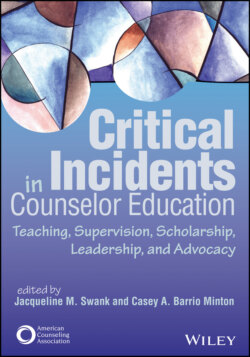Читать книгу Critical Incidents in Counselor Education - Группа авторов - Страница 23
Critical Incident Response
ОглавлениеSamir H. Patel
A common expectation across academic disciplines is that students will read assigned materials prior to the start of class. Despite being a necessity for most, if not all, counselor education courses, students do not always follow through with this requirement. Professor O experienced a conundrum when his approach to teaching did not account for student noncompliance with reading expectations. The case provides dialogue around potential reasons for readings not being completed, ethical issues this might pose, and cultural considerations of which to be mindful. These components are critical, and there are other opportunities to explore: (a) limitations of pedagogies, (b) specific techniques to increase reading compliance, and (c) cultural competencies to enhance student-teacher relationships.
Professor O took a humanistic and experiential approach to teaching. Major tenets of humanistic education include (a) creating learning environments that promote achievement by actualizing the full potential of students; (b) fostering a culture in which self-directed learning results in deep learning of new material; and (c) cultivating relationships in which cooperation, not competition, is center of the classroom experience (Khat-ib et al., 2013). In addition, the experiential teaching philosophy provides a path for assisting students in challenging personal beliefs while exposing them to diverse worldviews (Greene et al., 2014).
Professor O can use humanistic constructs to design courses and deliver content to promote student learning. Although he could penalize students for noncompliance by deducting participation points, this strategy would be out of character for an orthodox, humanistic counselor educator. Thus, an argument for considering limitations of the humanistic teaching philosophy is warranted.
There are a number of strategies for increasing student compliance with reading. For instance, Hoeft (2012) discussed the efficacy of attaching quizzes to readings, providing supplementary assignments tied to readings, and discussing readings in class prior to assigning them (e.g., hyping up chapters before students leave class). Kerr and Frese (2017) encouraged instructors to create collaborative apps (e.g., word clouds, wikis, Google Docs) to promote dialogue around readings outside of class. These types of self-directed learning activities are foundational to both humanistic and experiential teaching and might help Professor O view strategies to remedy student noncompliance through a student-centered lens.
The authors also noted the importance of viewing participation through a cultural lens. It is critical that instructors continue their professional development as it relates to the Multicultural and Social Justice Counseling Competencies (Ratts et al., 2016). Instructors should consider strategies to promote access for students of color. For instance, they can bring awareness to student research focused on social justice issues. Finally, instructors can demonstrate investment in students by checking in with them outside of class, which may create stronger relationships and increase student engagement in and outside of class.
Professor O considered the use of small-group experiences to promote in-class dialogue. This approach may also be culturally responsive for promoting dialogue among international students, who may not always feel comfortable engaging in classroom discussion because of cultural norms, language barriers, or concerns about not being able to accurately articulate their thoughts (Kwon, 2009). To circumvent some of these issues, instructors can create small groups, provide prompts to the students in advance, and provide feedback during group discussions to reinforce continued dialogue (Corse, 2011).
This case illustrates a common experience for instructors. When students do not follow through with expectations, the onus is on instructors to make changes to promote learning. Counselor educators are tasked with meeting students at their developmental levels while providing experiences that promote a professional counseling identity. All in all, Professor O’s adjustments modeled roles of counselor educators and expectations for counseling professionals without placing negative judgment on students.
• • •
